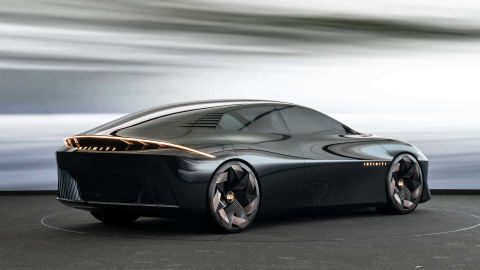Nissan delays two US-made EVs’ production to 2026 & 2027
Japanese multination automobile manufacturer Nissan Motor Company has reportedly delayed the production of two eagerly anticipated US-made electric vehicles (EVs) to 2026 and 2027. Once-pioneer in the realm of EVs with its Leaf electric car, Nissan is now lagging far behind its competitors in terms of EV production and sales. The latest setback faced by it is the delay in the start of the production of the two EVs that are scheduled to be produced in Canton, Mississippi.
Originally scheduled for launch in 2025, the two sporty sedans (one under the Nissan badge and the other under Infiniti) have now been pushed back to late 2026 and April 2027, respectively. According to insider information reported by various media outlets, the sedans, potentially reviving famous nameplates like Skyline and Maxima, were initially deferred by one year, followed by an additional three months. Now, the delay has been extended by another two months.
The Nissan electric sedan, which has been codenamed LZ1F, is set to enter production in the month of November in 2026, while the Infiniti EV, which has been codenamed LZ1E, is scheduled for series production in April 2027.
The justification behind the aforementioned delays, as revealed by a source within the automobile company, is the automaker’s apprehension regarding the success and market demand for EVs. Citing the need to improve product competitiveness, the Japanese car manufacturer is seemingly exercising caution amidst concerns about the pace of EV adoption.
With electric car inventory in the U.S. soaring by 92 per cent in 2023, signaling a slower adoption rate than previously anticipated, the automaker’s decision reflects a strategic pause to align with future demand. However, this move of the company also raises questions about the brand’s readiness to address evolving consumer preferences. As per a recent study conducted by J.D. Power, introducing more reasonably priced compact SUVs could accelerate EV adoption rates, indicating a possible divergence between market demand and the Japanese automaker’s current sedan-centric approach.
Hence, the delay in the start of production of the two EVs is a huge setback for Nissan, and especially for its luxury brand Infiniti, which lacks any EVs or hybrids in its aging lineup. Even in the face of all these challenges, Nissan executives remain resolute in their commitment to an electric future. A senior Nissan executive recently emphasized that the automaker intended to eliminate all non-EVs in Europe by the end of current decade.
